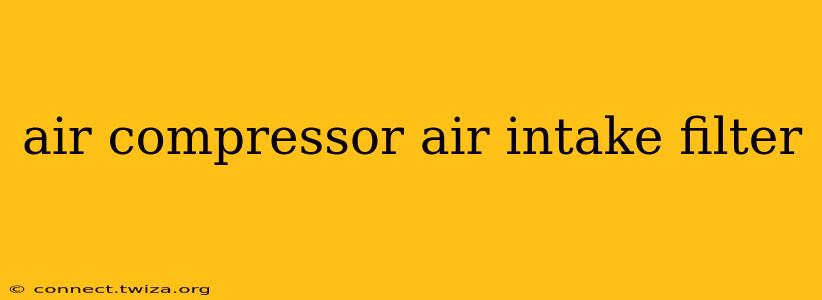The air compressor air intake filter might seem like a small, insignificant part of your system, but it plays a vital role in ensuring the longevity and efficiency of your equipment. Neglecting this often-overlooked component can lead to costly repairs and downtime. This comprehensive guide delves into the importance of air compressor air intake filters, their various types, maintenance schedules, and how to choose the right one for your needs.
What is an Air Compressor Air Intake Filter and Why is it Important?
An air compressor air intake filter is a crucial component that prevents contaminants like dust, dirt, moisture, and other airborne particles from entering the compressor's intake system. These contaminants can cause significant damage to internal components, leading to reduced efficiency, premature wear, and ultimately, costly repairs or even complete system failure. Think of it as a first line of defense, protecting your investment. A clean filter ensures that only clean air enters the compressor, optimizing its performance and extending its lifespan.
How Does an Air Compressor Air Intake Filter Work?
The filter works on the principle of filtration. It uses a porous media, usually paper, fabric, or a combination of materials, to trap particulate matter. The air is drawn in through the filter, leaving behind the contaminants, while allowing clean, dry air to pass through to the compressor's intake. The effectiveness of the filter depends on the quality of the filter media and its surface area. Higher-quality filters generally have finer pore sizes and greater surface area, leading to more efficient filtration.
What are the Different Types of Air Compressor Air Intake Filters?
Several types of air intake filters exist, each designed for different applications and levels of contamination. These include:
- Paper filters: These are commonly used in many air compressors and offer a good balance of filtration efficiency and cost-effectiveness. They are generally disposable.
- Fabric filters: Fabric filters are typically washable and reusable, making them a more environmentally friendly and potentially cost-saving option in the long run. They may offer slightly less fine filtration than paper filters.
- High-efficiency particulate air (HEPA) filters: These filters offer the highest level of filtration, removing even the smallest particles from the air. They are often used in applications where extremely clean air is required.
How Often Should I Change or Clean My Air Compressor Air Intake Filter?
The frequency of filter replacement or cleaning depends on the operating environment and the type of filter used. In dusty or dirty environments, the filter may require more frequent attention.
- Disposable paper filters: These typically need to be replaced every 3 to 6 months, or more often depending on usage and environmental conditions. Check your manufacturer's recommendations.
- Washable fabric filters: These can be cleaned more frequently, typically every 1 to 3 months. Always follow the manufacturer's instructions for cleaning to avoid damaging the filter media.
What Happens If I Don't Change My Air Compressor Air Intake Filter Regularly?
Neglecting regular filter maintenance can lead to several problems:
- Reduced air compressor efficiency: A clogged filter restricts airflow, causing the compressor to work harder and consume more energy.
- Premature wear and tear: Contaminants can damage internal components, leading to shorter lifespan and increased maintenance costs.
- Increased risk of system failure: Severe contamination can lead to catastrophic failure, potentially resulting in expensive repairs or complete system replacement.
- Compromised air quality: Contaminants can pass through a clogged filter and negatively impact the quality of compressed air used in applications.
How Do I Choose the Right Air Compressor Air Intake Filter?
Selecting the right filter involves considering several factors:
- Compressor model: Always consult your compressor's manual for the recommended filter type and specifications.
- Operating environment: A dusty environment requires a higher-efficiency filter than a clean environment.
- Filter efficiency: Consider the level of filtration required for your specific application.
- Filter cost and lifespan: Balance the initial cost with the long-term cost of replacements or cleaning.
What are the signs that my air compressor air intake filter needs replacing?
A noticeable drop in air pressure, increased compressor run time, unusual noises from the compressor, and visible dirt or debris on the filter are all strong indicators that it’s time for a filter change or cleaning.
Can I clean a disposable air compressor air intake filter?
No, disposable filters are designed for single use. Attempting to clean them will likely damage the filter media and compromise its filtration efficiency. Always replace disposable filters as recommended.
Are there different sizes of air compressor air intake filters?
Yes, air compressor air intake filters come in various sizes depending on the model and make of the compressor. It's crucial to select the correct size to ensure a proper fit and efficient operation.
By understanding the importance of regular maintenance and selecting the appropriate air compressor air intake filter, you can ensure the optimal performance, longevity, and safety of your equipment. Remember, a little preventative maintenance goes a long way!
